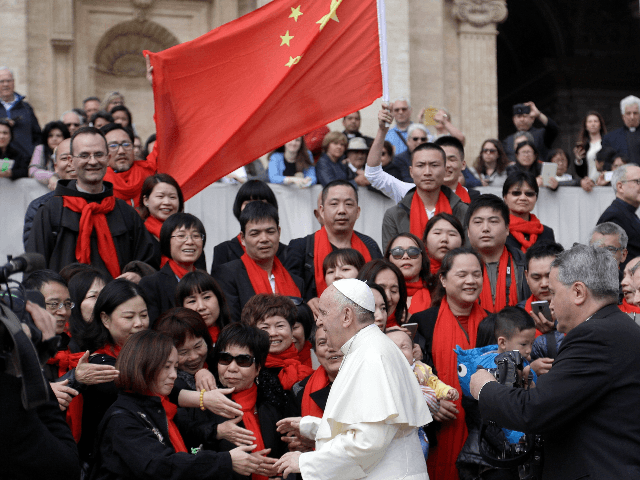ROME – Chinese Foreign Minister Zhao Lijian denied allegations Thursday that Beijing had “pressured” Pope Francis into not speaking about freedom and human rights in Hong Kong during his Angelus message last Sunday.
“I am not aware of the situation, but we hope and believe that people of vision who truly care about Hong Kong will choose to act in ways beneficial to Hong Kong’s development,” Mr. Zhao said during a July 9 press conference.
“China will continue to engage in constructive dialogues with the Vatican and work for the improvement of bilateral relations,” he said.
As Breitbart News reported, last Sunday the pope decided at the last minute to pull a section of his weekly Angelus address dealing with Hong Kong freedoms.
The Holy See Press Office had distributed an embargoed copy of the pontiff’s words to accredited journalists Sunday morning, including a 150-word paragraph dealing with Hong Kong that the pope ended up skipping.
The omission stirred up considerable controversy among Vatican watchers, with some suggesting that China had exerted pressure on the pope to omit references to Hong Kong, an implausible theory given that it would mean that China would have had to have an advanced copy of the pope’s address and been able to contact him in the meantime to convince him not to pronounce it.
The best case — and most likely — scenario is either a lack of communication between Vatican speech writers and the pope over the Hong Kong question or an initial green light from Francis, who would have later thought better of it and scrapped the paragraph.
In point of fact, the Vatican has studiously avoided criticizing China over its human rights abuses and the pope has downplayed the gravity of Hong Kong’s situation when asked about it directly.
The Vatican has adopted the opposite approach, engaging in an ongoing charm offensive with Beijing in the hope of being able to establish formal diplomatic ties with the Chinese Communist Party (CCP). The pope has insisted that the CCP protects religious freedom in China, while the chairman of the Pontifical Academy of Sciences has declared China to be a model of Catholic social teaching in practice.
For his part, the former bishop of Hong Kong, Cardinal Joseph Zen, said recently that he is prepared to suffer arrest and trials under Hong Kong’s oppressive new National Security Law.
“If right and proper words were considered against their law, I will endure all the suing, trials, and arrests. Numerous predecessors have endured similarly,” the 88-year-old cardinal said in a video posted on Facebook.
“Perhaps they are truly insane. Who knows? Let them be then,” the cardinal said. “Isn’t there a saying: ‘Those whom God wishes to destroy, he first makes mad’?”
In late May, China’s National People’s Congress (NPC) hastily passed a draft law eliminating Hong Kong’s autonomy and enabling the Communist Party to punish anyone in the nominally autonomous city for crimes such as “secession” and “acts against national security.”
On June 30, Chinese President Xi Jinping signed a decree enacting the National Security Law, provoking widespread concern among participants in the Hong Kong pro-democracy movement.

COMMENTS
Please let us know if you're having issues with commenting.